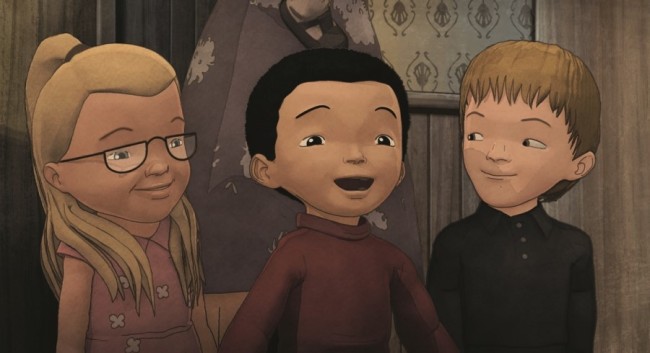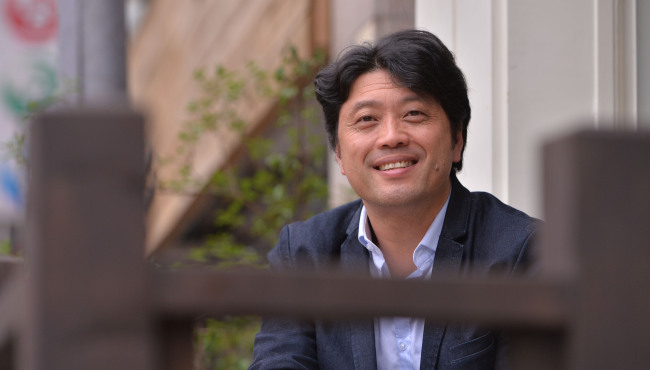Filmmaker brings moving portrait of his adoptee life to big screen
Jung Henin says foreign adoptions of Korean children must stop
By Claire LeePublished : May 9, 2014 - 21:25
Korean-born Belgian filmmaker Jung Henin (Jeon Jung-sik) was only about five when he was adopted by Belgian parents after being found as a lost child at Namdaemun Market in Seoul. He doesn’t know who filled out his adoption papers, but whoever it was recorded his skin color as “miel,” which means “honey” in French, instead of “Asian.”
Now 48, Henin, who wants to be called by his Korean name, recently visited Seoul for the local release of his autobiographical animated film “Approved for Adoption.” Its French title “Couleur de peau: Miel,” or “Color of Skin: Honey,” was inspired by what was written on his adoption papers.
“I’ve always thought the way (the papers) described my skin color, that it was the color of honey, was beautiful and poetic,” the filmmaker said. “I’ve always thought this would be the title of the film. I didn’t have to think twice.”
The film, which opened here on May 8, Korea’s Parents’ Day, is an unusually honest and often heartbreaking tale of growing up and going through an identity crisis, and a moving homage to his two mothers ― his biological mother and the one who raised him. The documentary has been screened in 80 film festivals worldwide and has won 23 awards, including the Grand Prix at the Zagreb Animafest Festival 2013 and the Best Feature Film Award at last year’s Anima Mundi International Animation Film Festival.
Now 48, Henin, who wants to be called by his Korean name, recently visited Seoul for the local release of his autobiographical animated film “Approved for Adoption.” Its French title “Couleur de peau: Miel,” or “Color of Skin: Honey,” was inspired by what was written on his adoption papers.
“I’ve always thought the way (the papers) described my skin color, that it was the color of honey, was beautiful and poetic,” the filmmaker said. “I’ve always thought this would be the title of the film. I didn’t have to think twice.”
The film, which opened here on May 8, Korea’s Parents’ Day, is an unusually honest and often heartbreaking tale of growing up and going through an identity crisis, and a moving homage to his two mothers ― his biological mother and the one who raised him. The documentary has been screened in 80 film festivals worldwide and has won 23 awards, including the Grand Prix at the Zagreb Animafest Festival 2013 and the Best Feature Film Award at last year’s Anima Mundi International Animation Film Festival.

Although Jeon now appreciates his cultural and ethnic background ― the filmmaker concluded he is both European and Korean, and the two blend rather beautifully in forming his identity ― growing up as a Korean adoptee in Belgium was never easy.
The film, which blends animation and live action, chronicles his checkered childhood experiences in a crowded household, including his first encounter with his younger sister, who was also a Korean adoptee, and all the trouble he got into for lying and stealing at school and fabricating his grades on his report card.
“I think I was angry as a child and such anger was expressed in the form of misbehavior,” said Jeon through an interpreter during an interview with The Korea Herald in Seoul. “I now think it was also my way of getting more attention from my parents.”
When Jeon was a child, he was angry at Korea because he thought the country abandoned him and his friends ― there were many Korean adoptees of his age in his town. He dreamed of becoming a Japanese. In the film, the young Jeon becomes obsessed with Japanese martial arts and music.
“When I looked into the mirror, I saw an Asian,” said Jeon. “Because what I saw was an Asian, I could not consider myself a Belgian.”
Jeon visited Korea for the first time in 2007, at age 42, to work on the film “Approved for Adoption.” After almost 40 years living as a Korean adoptee in Europe, Jeon said the foreign adoption of Korean children must be stopped by the government, and there should be more support for unmarried single mothers, who are very often stigmatized in Korea.

“What I am against is, to be more precise, foreign adoption of a large number of Korean children all at once,” Jeon told The Korea Herald. “From what I know, a lot of Korean children were adopted by foreign parents in the 1970s and ’80s, and almost two-thirds of adoptees worldwide in the time period were from Korea. It’s important to offer more options to single mothers in Korea so they aren’t forced into giving up their children.”
Jeon’s film does not avoid vexing subject matter, including his difficult adolescence, when he and his adoptee friends struggled with their identity. Some of his friends committed suicide, while one of them spent many years at a mental institution. Jeon, on the other hand, left home and stayed at a priest’s house, where he behaved self-destructively by only eating steamed rice and a lot of Tabasco sauce. He eventually fell ill from consuming too much pepper sauce every day.
“There is this feeling of emptiness that you always have to endure (as an adoptee),” Jeon said. “You’d very often think, ‘My biological parents gave up on me because they did not want me,’ or ‘They gave up on me because I was a bad child.’ And you really can’t figure out why they gave you up (unless you find them and ask them) and the empty feeling just continues to haunt you. Many adoptees end up committing suicide after agonizing over such unresolved issues.”
Jeon said children adopted by foreign parents often have to endure more hardships. “If a Korean child is adopted by Korean parents in Korea, the kid will grow up thinking she or he is Korean (regardless who the biological parents are). But if the child is adopted by Belgian parents, it’s inevitable to think about and be confused by what his or her identity is ― whether he or she is Belgian or Korean.”
Jeon’s film also deals with his turbulent relationship with his adoptive mother, whom he eventually reconciles with and pays respect to. “You know, mothers usually hold and hug their children like that,” Jeon said, pointing at a pedestrian who happened to be walking by with her child in her arms.
“My mother never did that to me or my siblings, except to my younger sister Valerie (who had a number of health problems as a child). Now I know that she’s always loved me; I think she just didn’t know how to express it. A lot of adoptees seek more attention and affection from their parents than the children who haven’t been adopted. Because my mother never hugged me or touched me, I thought she didn’t love me. And I was angry at her for that for a long time.”
For children who have been adopted by foreign parents, Jeon said it is best to accept their situation as it is. “Don’t think there is something wrong with you because you were adopted,” he said. “It’s better to accept both cultures ― Korean and that of your adoptive parents ― as yours and appreciate them rather than rebel against them. Think of it as an asset rather than a flaw.”
For parents who are thinking of adopting children from overseas, Jeon had a simple piece of advice. “Just give them all the love you can give, and let them know that you love them as much as possible,” he said. “That’s all I can really say.”
Jeon married a Korean adoptee, with whom he had a daughter. Their teenage daughter participated in “Approved for Adoption” as well, creating the soundtrack for the movie. “Being a father made me realize parenting isn’t always easy,” Jeon said. “I assume it must have been very difficult (for my adoptive parents) to bring up a child who was going through a very unhappy time in life.”
An avid fan of Korean cineastes such as Park Chan-wook, Bong Joon-ho and Lee Chang-dong, Jeon said he was particularly touched by veteran auteur Im Kwon-taek’s 1993 film “Seopyeonje,” a poignant tale of a young female “pansori” (Korean folk narrative) singer whose father blinds her to make her a true vocalist. He met with filmmaker Lee Chang-dong in Korea last year, who complemented “Approved for Adoption” for its honesty in description as well as its use of both animation and live action for the documentary genre.
Jeon said he hopes to make another film in Korea with a focus on one of the themes that was dealt with in “Approved for Adoption,” and featuring more live action than animation this time.
On top of its Korean release, “Approved for Adoption” will get a special screening at the United Nations Headquarters in New York City on May 16.
By Claire Lee (dyc@heraldcorp.com)


![[KH Explains] No more 'Michael' at Kakao Games](http://res.heraldm.com/phpwas/restmb_idxmake.php?idx=644&simg=/content/image/2024/04/28/20240428050183_0.jpg&u=20240428180321)




![[Grace Kao] Hybe vs. Ador: Inspiration, imitation and plagiarism](http://res.heraldm.com/phpwas/restmb_idxmake.php?idx=644&simg=/content/image/2024/04/28/20240428050220_0.jpg&u=)


![[Herald Interview] Mom’s Touch seeks to replicate success in Japan](http://res.heraldm.com/phpwas/restmb_idxmake.php?idx=644&simg=/content/image/2024/04/29/20240429050568_0.jpg&u=)







